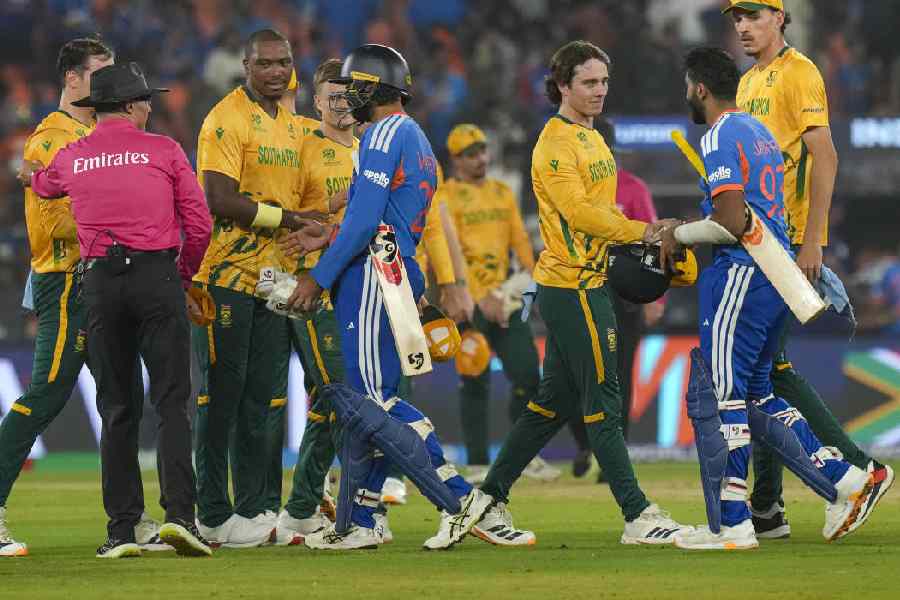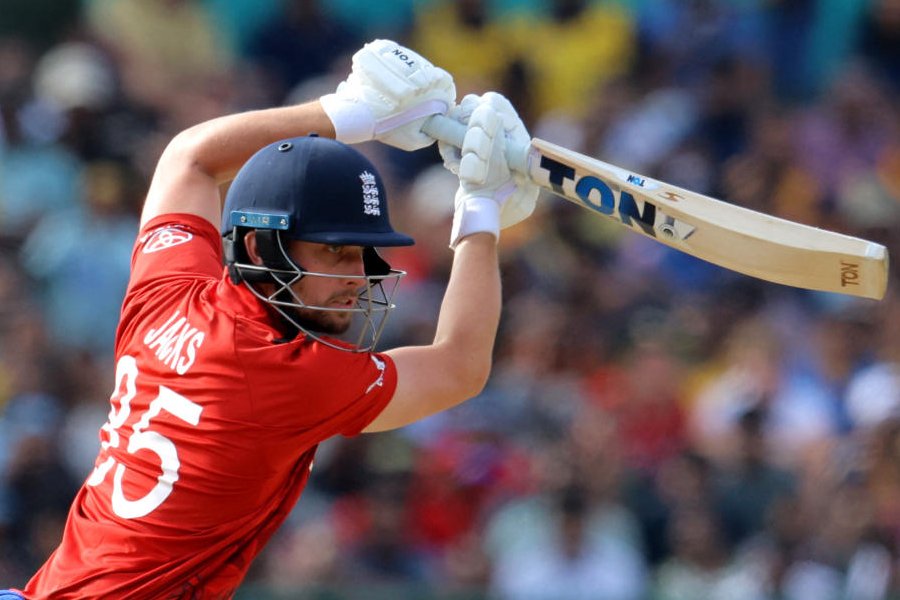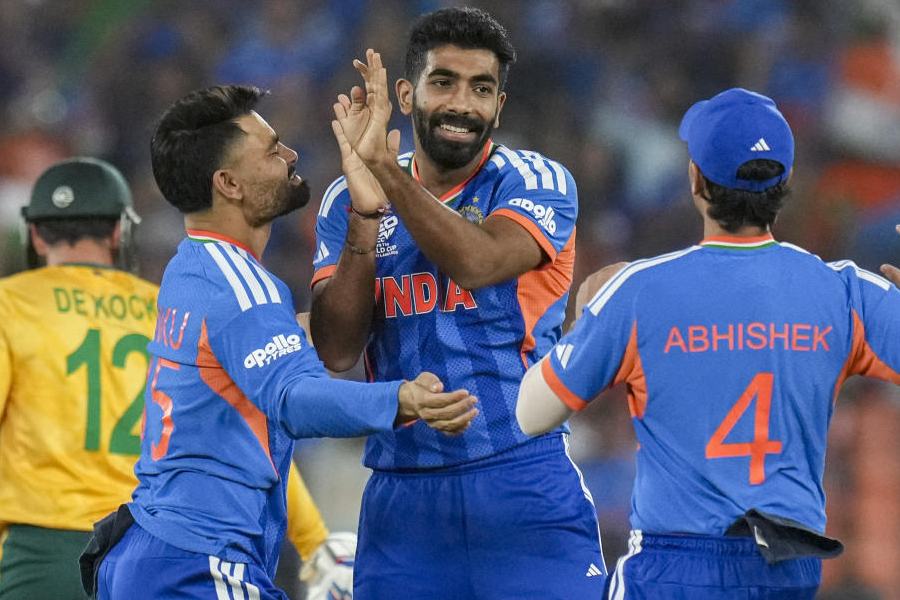 |
| The Middle Temple, one of the four Inns of Court exclusively entitled to call their members to the English Baras barristers. According to records, Basu “registered here as the son of Nishi K. Basu of 55 Hindustan Road, Calcutta. He was called to the Bar on January 26, 1940, in absence — which means he could not come in person but he had qualified as a barrister”. |
Jyoti Basu’s youthful student days in London, when he was moved by the plight of poor Bengalis who had jumped ship on reaching England, left a profound impression on him and probably shaped his political outlook on life, according to family and friends.
“London turned him into a Marxist,” his granddaughter Mallika Basu said. “That’s what has come down in the family.”
Basu was 21 when he arrived in London from Calcutta to train to be a barrister. According to records at the Middle Temple, “He was a student at University College London when he was admitted on October 27, 1935. He registered as the son of Nishi K. Basu of 55 Hindustan Road, Calcutta. He was called to the Bar on January 26, 1940, in absence — which means he could not come in person but he had qualified as a barrister.”
The young barrister had already left for Bombay on January 1, 1940. Once in Calcutta, he had no wish to return to the UK or to law.
“After studying law, the last thing he wanted to do was practise law,” said Mallika, who has lived in London for the past 14 years and is making a name for herself as a chef and writer specialising in regional Indian cuisine.
Although the former chief minister was a very busy politician, Basu apparently always found time for his son Chandan’s three daughters, of whom Mallika is the eldest.
“To us he was the best grandfather in the world,” recalled Mallika, who was a pupil at La Martiniere for Girls in Calcutta.
 |
| Basu in Geoffrey Moorhouse’s 1971 book, Calcutta |
 |
| Jyoti Basu loved the stage adaptation of Madame Bovary by Gustave Flaubert |
He took an interest in the education of his granddaughters and joined them on holidays. The family man was quite different from the reserved politician the world would get to know.
Once, when Mallika stood in a beauty contest, her grandfather was delighted.
“He came home, calling out, ‘ Beauty Queen, Beauty Queen!’ This was the time of Sushmita Sen and I had come last in the contest. I was no great looker,” added Mallika modestly, though she is known in London for being quite a looker.
She has many other fond childhood memories from when she was even younger. “Once he brought the traffic to a stop because he had stopped at a toy shop,” Mallika remembered.
As chief minister, it became routine for Basu to take his annual leave in London, where he would spend between two and four weeks.
According to Prasanta Ray, a long-time communist party member who became part of the chief minister’s UK circle, Jyotibabu “loved London and especially loved going to the theatre”.
Ray could not remember the West End performances to which he had accompanied his mentor save for one — Madame Bovary. This was based on Gustave Flaubert’s French masterpiece which tells the story of a doctor’s wife, Emma Bovary, who has adulterous affairs and lives beyond her means in order to escape the banalities and emptiness of provincial life.
London provided Basu with some relaxation away from the chief minister’s job, it seems. “Once he stopped being chief minister, he hardly came to London,” Ray pointed out.
Basu occasionally discussed his formative period in London. He had been moved by the poverty-stricken conditions of people from East Bengal who congregated in the East End of London after jumping ship. Few of them knew any English.
“He said he organised English lessons for them,” Ray said. “Later, he had friends who invited him to the House of Commons.”
The friends included Michael Foot, who succeeded in becoming leader of the Labour Party though not in winning an election. Another admirer was Tony Benn, the veteran Labour Left-winger and cabinet minister in Harold Wilson’s government.
 |
| Basu’s granddaughter Mallika Basu |
Benn, who said he had always been a strong supporter of Indian Independence — he had an encounter with Gandhi in 1931 — told The Telegraph that he had met Basu both in London and in Calcutta.
“I went to Calcutta to give a lecture and met him,” said Benn. “I had met him in London as well. He was a remarkable man who was much respected. I liked him. He was a great Indian leader and I was very impressed. He was a democrat who was doing a good job in difficult circumstances. He once told me he had been invited by the Chinese.”
Benn laughed as he recounted: “They asked him, ‘How does a communist win an election?’”
Basu, according to a spokesman for University College London, was “a part time student here from 1935-36 and from 1936-37”. The London School of Economics is proud to claim him as one of its distinguished Indian alumni. Other Indian alumni who have had links with the LSE include Amartya Sen, Manmohan Singh, K.R. Narayanan, Bhimrao Ambedkar, and V.K. Krishna Menon. The LSE has few details of Basu’s time at the college, although it has been claimed that as a young student he attended lectures by Harold Laski, its famed professor of political science.
During his student days in London, Basu became a member of the India League, the organisation led by Krishna Menon to campaign for Indian Independence. He also joined the Federation of Indian Students in Great Britain and the London Majlis.
A contemporary, the political columnist Nikhil Chakraborty, who had known Basu from his London days, once wrote: “In the early years during the student days, quite a number of us were drawn towards Marxism. In the wide open space of youth and student activity, we were all proud of Jyoti as the very active president of the London Majlis.”
The impressionable young man met some of the noted personalities of the Communist Party of Great Britain, among them Ben Bradley, Rajani Palme Dutt and Harry Pollitt, and was strongly influenced by Marxist ideology.
“In those days, any notable leader from our national movement coming to England would be addressing the London Majlis,” Chakraborty had explained.
“The roll of honour included all shades of opinion from Jawaharlal Nehru and Subhas Chandra Bose to Yusuf Meherali and Vijayalaxmi Pandit, from Bhulabhai Desai to Purnima Banerji. We could depend upon Jyoti to conduct the proceedings of such gatherings with poise and sang-froid.”
In his 1971 book, Calcutta, the author and former Guardian journalist Geoffrey Moorhouse summed up: “Basu is the kind of man of whom Bengali legends are created.”










